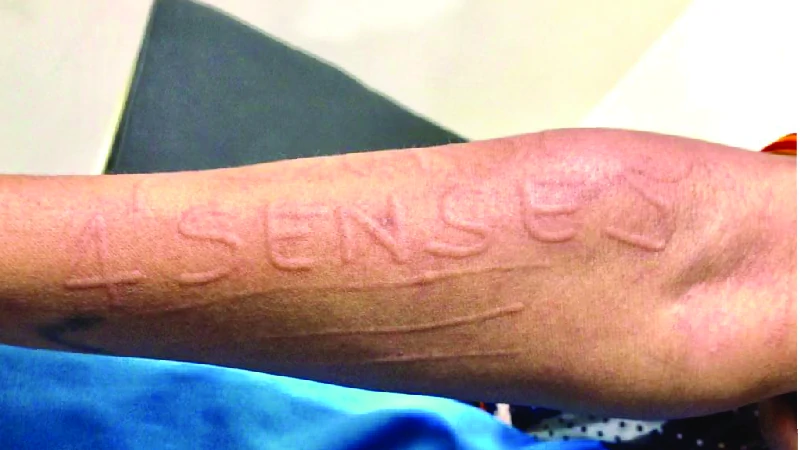
Treatment for Urticaria ( Hives or weals ) and Angioedema in Bangalore
Urticaria (Acute urticaria) is a common dermatological condition (commonly called as skin allergy by people) that presents with redness, edema and itchy swellings of the skin measuring several millimeters to centimeters or much larger in size.Although acute urticaria is often transient and self-limited, it can cause significant discomfort due to itching which disturbs with daily routine and even sleep.
Chronic urticaria - In some patients the condition may continue to last for months to years . If the urticaria persists for more than 6 weeks, it is termed as chronic urticaria.
Angioedema - In some, urticaria may be associated with significant swelling of the sub cutaneous tissue and mucosa, known as Angioedema.Its a painful and serious life-threatening allergic reaction which needs intervention immediately . It presents with swelling of the soft tissue involving the eyelids, upper respiratory tract and gastro intestinal wall.
Causes for urticaria
- Drugs - Penicillins, cephalosporins, sulfonamides and tetracyclines are some of the drugs which induce urticaria.
- Picking of Acne lesions.
- Infections - Hepatitis B viral infection, streptococcal throat infection, and Campylobacter are few infections which cause acute urticaria. Bacterial infections of the dental, throat, respiratory, urinary tracts and gall bladder may be responsible for chronic urticaria.
- Infestations - Parasites in the stomach and intestines.
- Inhalants - substances like grass, pollens, mould, spores, animal danders, and house dust may cause acute or chronic urticaria.
- Ingestion - Ingestion of certain foods like Fish, milk, peanut, beans, potato, rice, carrot, drumstick etc
- Insect bite - Mosquito bite, bee and wasp stings, bed bug bites.
- Implants - Dental implants and metal pins in orthopedic treatments.
- Systemic disease - thyroid , lupus erythematous and other auto immune diseases.
- Others - Psychological stress may also lead to urticaria.
Management
The doctor will do a physical exam and ask you a number of questions to understand what might be causing your signs and symptoms. He may ask you to keep a diary to keep track of:
- Your activities
- Any medications, herbal remedies or supplements you take
- Where hives appear and how long it takes to fade
- Whether your hives come with painful swelling
Depending on the history and physical examination, the Doctor might advice you to under go several investigations
- Initial screening tests - Blood check up, urine analysis, Stool examination.
- Disease specific tests to find out underlying diseases - Thyroid function tests, liver function tests, patch test & prick test, Autologous serum skin test etc
- Special tests like X-ray of chest, sinuses, teeth.
Treatment
Depending on the duration , severity & type of urticaria and underlying pathogenesis , the treatment may include
First line therapy - Anti histamines
Second line therapy - Systemic corticosteroids, H-pylori eradication, phototherapy, Narrow band UV therapy, tolerance induction.
Third line therapy - Plasmapheresis, cyclosporines, Intra venous immunoglobulin infusion (IVIG)
At 4 Senses, the treatment is not only aimed at healing the current condition, but also finding out the underlying trigger factor or systemic disease and treating them. There by preventing the recurrence of disease and providing a long term relief. If you are looking for treatment for urticaria, Contact Call:6366494494
